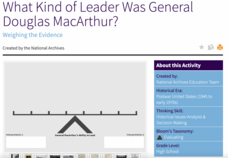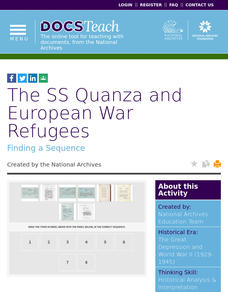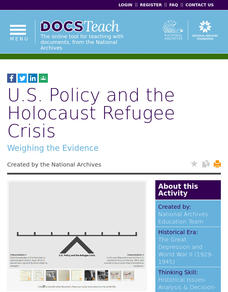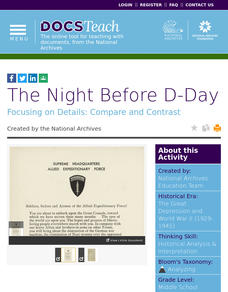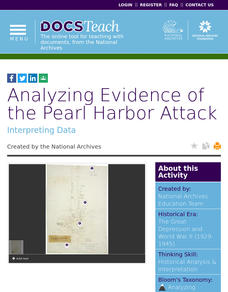Franklin D. Roosevelt Presidential Library & Museum
Pearl Harbor Activity #1: Newspaper or Radio Account
After listening to President Franklin D. Roosevelt's "Day of Infamy" speech, young historians research information about the Japanese attack on Pearl Harbor, possible motives for the attack, and the consequences of the attack. Scholars...
National Park Service
Remembering Pearl Harbor: The USS Arizona Memorial
Young historians use primary source materials to investigate the 1941 attack on Pearl Harbor and the sinking of the USS Arizona. After reading background articles and studying maps and images of the attack, class members consider whether...
Center for History Education
To What Extent Were Women's Contributions to World War II Industries Valued?
Women rose to the challenge when the nation's war effort called them—but were sent home when the GIs came back from World War II. Young historians consider whether the United States valued women's contributions during the war using a...
DocsTeach
What Kind of Leader Was General Douglas MacArthur?
For five decades, General Douglas MacArthur shaped US military involvement around the world. His career ended when he went toe to toe with President Dwight Eisenhower over the Korean War. Young historians evaluate the complicated command...
DocsTeach
Baseball: A Morale Booster During Wartime?
How did baseball become America's national pastime? A sports-minded activity explores the importance government placed on baseball to boost morale during both world wars. Academics read letters to understand the importance of baseball...
The Formation of the Western Alliance, 1948–1949
Silence is golden—even when debating post World War II foreign policy. Using a silent debate format, young historians deliberate whether the United States should have kept a foothold in West Germany after World War II. A series of videos...
Livaudais-Baker English Classroom
Lord of the Flies
What do The Simpsons, Survivor, Sponge Bob Square Pants, and Nine Inch Nails all have in common? They all include allusions to Lord of the Flies. Strange but true! An 18-slide presentation introduces viewers to the many layers of William...
Center for History Education
African Americans and the Democratic Party
Why did African American voters switch from the Republican Party to the Democratic party during the Depression Era? That is the question young historians attempt to answer as they study primary source documents from the period. The focus...
DocsTeach
WWI Propaganda and Art
Uncle Sam wants you! During World War II, the US government and military created a propaganda campaign to gain public support. The activity uses primary documents such as photos to explain how and why the propaganda campaign was...
Center for History Education
Japanese American Internment During World War II
World War II turned nations against each other and neighbors into enemies. An eye-opening lesson explores the dark past of Japanese-American internment camps during WWII. Scholars learn of the fear and distrust toward Asian Americans...
Center for History Education
Continuity or Change? African Americans in World War II
While World War II was a pivotal moment in history, historians debate its importance to the civil rights movement. Class members consider the implications of segregation and the war using a series of documents and a jigsaw activity....
Smithsonian Institution
Racism and Removal: Japanese Incarceration During World War II
During World War II people saw how far the government's control would go, but it was at the expense of its citizens. The resource brings the conditions of Japanese American internment camps to light using primary documents. Scholars...
Digital Public Library of America
Their Eyes Were Watching God by Zora Neale Hurston
Zora Neale Hurston's novel Their eyes Were Watching God has been highly praised and severely criticized for its depiction of African American folk culture. A set of primary source materials, including photographs, articles, essays, and...
DocsTeach
The SS Quanza and European War Refugees
World War II not only resulted in major loss of life, but it also displaced thousands of people. An eye-opening activity uses primary documents to explore the refugee crisis during World War II. Scholars compare the event to modern-day...
DocsTeach
U.S. Policy and the Holocaust Refugee Crisis
How did the United States respond to the Holocaust refugee crisis during World War II? The activity focuses on the United States' foreign policies and the arguments for and against offering assistance. Scholars analyze historical...
DocsTeach
Two Versions of FDR's Infamy Speech
Historians follow FDR's Infamy speech from rough draft to the official address to the Senate. An intriguing activity compares and contrasts FDR's original speech to the official version. Academics also listen to FDR address the Senate....
DocsTeach
The School Lunch Program and the Federal Government
The school lunch program is rooted in the struggles of the Great Depression and is still assisting families today. Academics research documents and images relating to the creation of the school lunch program. Scholars use a worksheet to...
DocsTeach
The Night Before D-Day
Get inside the mind of General Eisenhower regarding the D-Day invasion. An interesting activity uses historical documents to highlight the differences between Eisenhower's public stance on D-Day and his private opinions. Scholars analyze...
DocsTeach
The New Deal: Revolution or Reform?
Scholars weigh in on FDR's New Deal policies in an in-depth activity. The resource uses historical documents to explore whether the New Deal polices were reformatory or revolutionary. Learners review documents, rate them using a scale,...
DocsTeach
Pearl Harbor Dispatch Analysis
Scholars play a historical version of the telephone game when they analyze the dispatch from the Pearl Harbor attack. The quick activity uses primary sources to help academics analyze an historical event. Young historians also complete a...
DocsTeach
Letter to Truman about the Manhattan Project
Delve into the past to understand the opposition to the Manhattan Project. An interesting activity is designed to be completed in pairs, groups, or individually. Scholars analyze historical documents, complete an online worksheet, and...
DocsTeach
Analyzing Evidence of the Pearl Harbor Attack
Don some detective caps and delve into the past to explore the evidence left behind after the attack on Pearl Harbor. An interesting activity uses primary sources to explore how the United States Navy was caught off guard and how the...
DocsTeach
Analyzing a Writing Assignment by a Teenage Refugee in New York During World War II
Young historians delve into the world of teenage refugees during WWII to understand their experiences. The activity focuses on a writing assignment from a teen staying at a US refugee camp to explore the struggles they faced, such as...
DocsTeach
Court Packing vs. Reorganizing: The Supreme Court in the New Deal
Travel back in time to understand the effects of FDR's New Deal on the Supreme Court. Academics analyze historical documents to understand FDR's attempts to pack the Supreme Court and the opposition he faced. The activity includes a...





